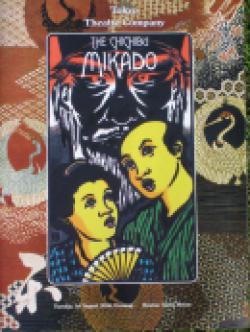The Chichibu Mikado

Conductor and translator Toru Sasakibara, director Kyoko Fujishiro, original script and music by W.S. Gilbert & A. Sullivan
Performed by the Tokyo Theatre Company as part of the International Gilbert & Sullivan Festival (2006)
Review by Sean Curtin
For the first time ever a Japanese theater company came to the UK to perform the Mikado in Japanese to an enthusiastic British audience. The lively and brilliantly colourful production was part of the 2006 International Gilbert & Sullivan Festival in Buxton, Derby. It perfectly blended Japanese and British elements to create an astonishingly successful hybrid which was true to the original, while incorporating some crowd-pleasing Japanese innovations. The standard musical numbers remained essentially the same except for two insertions of Japanese taiko drums pieces between the overture and the curtain rise and another for the well-received ballet scene towards the end of Act II.
Despite the fact that the audience was a largely non-Japanese speaking British one, they appeared to really enjoy the show. Most were Gilbert & Sullivan aficionados, so were familiar with the English lyrics and seemed to relish the opportunity of listening to them in a foreign tongue. Occasionally, the Japanese company broke into English at the points in the script where the characters discuss the difficulties of the English and Japanese languages. These scenes got lots of laughs, while the innovative ballet scene and taiko drums accompaniments were the highlights for many.
Toru Sasakibara, a veteran director, energetically conducted and was also the translator of the lyrics into Japanese. Watching the lively perform you never would have imagined that Gilbert & Sullivan's world famous Mikado was actually banned in Japan shortly after its 1885 premier. It was consider too disrespectful towards the Emperor to be performed in Japan and Japanese elites who saw it in European capitals were highly critical of the Chinese sounding names of the lead characters and farcical depictions of Japan which seemed to confirm their view that Westerners could not distinguish between Japan and China. In fact, the light opera caused a number of headaches over the years for Anglo-Japanese relations. British diplomats did their best to ensure it was either not performed in Japan or if it was that only a revised production staged with all references to the Emperor deleted. When Prince Fushimi visited London in 1907, all performances were temporarily suspended. It was not until after WWII that it was performed properly in Japan and even then it received a very cold reception from Japanese audiences.
The Mikado is set in the Japanese town of Titipu, which is believed to be modern day Chichibu, a mountain city about 75 kilometers northwest of Tokyo. It was the Titipu- Chichibu link that was the driving force for the real emergence of the musical in Japan. Once Chichibu locals realized that their hometown was immortalized in the internationally famous operetta, the urge to highlight this claim to fame become too irresistible. After several years of effort, in March 2001 the citizens of Chichibu succeeded in staging the opera's first Japanese language performance to a mainstream audience. It was a runaway success and since then it has been restaged not only in Chichibu, but several other venues including Ikebukuro in Tokyo. Its export to the UK has also been warmly welcomed. The only real criticism is that this amazingly enjoyable and fantastically colourful spectacle was only stage for one single performance.

